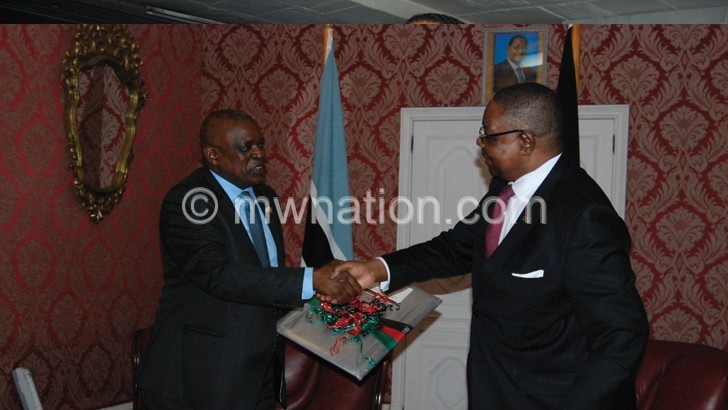Botswana tips Malawi on mining
Botswana says Malawi stands to benefit from Botswana’s expertise in the mining sector but needs to put in place proper legislation and build befitting technical capacities and strategies.
Botswana President Mokgweetsi Masisi said yesterday at Sanjika Palace in Blantyre that his government was ready to support Malawi to develop its mining sector with various forms of expertise.
He said mining was a process that passes through many points, but vital issues remain governance and legislative architecture which has seen his country owning 80 percent of the mining with only 20 belonging to foreign investors.

after their meeting
Said Masisi: “There are certain techniques, technologies and competences but more than anything else it is the governance, the legislative architecture. We have been through it like many countries have.
“We don’t claim to be superior we just claim to have derived the most in our experience. We started from zero but our first negotiation position has proved to be the right one.”
His comments come at a time local mining experts have argued that it would be too ambitious for government to count on mining as a revenue source in the short term as the sector is still in its infancy stage.
According to the Malawi Growth and Development Strategy (MGDS 11) review report, the country’s mining sector is constrained by technical capacity, governance and weak geological information.
The Botswana President was in the country for day-long bilateral talks with President Peter Mutharika in which the two discussed in private several areas of cooperation, including mining, education and tourism.
But the Botswana President said his country had done well because it brought in external experts to start mining and put in place appropriate legislation while accepting who they were, what they knew and did not know and that became their groundbreaking.
“Part of the mineral legislation in Botswana demands that anything found belongs to the State and if anybody wants to go after it as an investor they will be given permission but they are licensed after due diligence.
“Even after licensing, because the mineral wealth in its raw form belongs to the State, they will pay a royalty for what they get so there is a valuation system to determine what it costs.
“So you need to develop all these competencies. We are not fully there yet but we have moved a great deal in the plus-minus 40 years we have experience in mining and we hope you will never negotiate wrong,” he said.
On his part, Mutharika observed that Botswana had one of the great mining laws in the world and Malawi had started negotiations on how to benefit from their expertise.
The President also admitted that the country lost a great deal under Kayelekera Uranium Mine in Karonga which was owned by Paladin Africa because of a poor agreement that did not favour the nation.
In September last year, government gave nine mining firms notices expressing its intention to terminate their licenses for non-payment of fees, ground rates and royalties amounting to about K900 million and for general non performance as stipulated in their licenses.
Government’s action came after Malawi’s first Extractive Industry Transparency Initiative (EITI) report issued in July last year showed that about K800 million as revenue declared by mining companies in 2014 could not be reconciled in government accounting books.
The report launched in Lilongwe said the unreconciled revenue was equivalent to about 43 percent of the total revenue government generated from the extractive sector in 2014 alone. n





